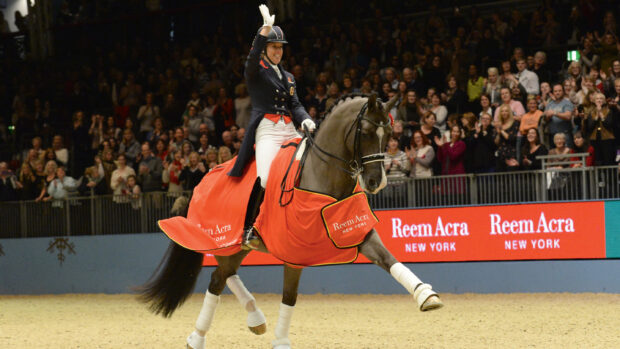The British Equine Veterinary Association (BEVA) cited tests for myopathies including diseases known as type two polysaccharide storage myopathy (PSSM2), myofibrillar myopathy (MFM) or muscle integrity myopathy (MIM).
“Despite the lack of evidence to support the tests, the practice has become widespread within some breed groups and drastic results have included euthanasia of seemingly normal animals,” a BEVA spokesman said.
Richard Piercy, of the Royal Veterinary College’s neuromuscular diseases laboratory, said there are no scientifically validated genetic tests for PSSM2, MFM or MIM.
“Scientists still do not know whether these are diseases at all, or whether they reflect histopathological features of non-specific muscle damage that might have various genetic but also environmental causes,” he said.
“It can of course be very tempting for a horse owner, when their horse has signs that might suggest a muscle problem, to seek any answer they can find, particularly when the problem is proving challenging to diagnose and manage. It might be even more tempting for an owner to believe an unsubstantiated genetic result when it ‘fits’ with what they have suspected. But given the high prevalence of the genetic variants in the horse population that are tested for, many horses will test positive just by chance – whether or not they have any disease at all.”
Type one PSSM can be diagnosed by DNA testing of a mutation that has been “robustly evaluated”. But the best way to identify other equine myopathies is usually clinical examination, biochemical tests and sometimes muscle biopsy, the BEVA spokesman said.
“Further, because it is not yet known what causes PSSM2, MFM or MIM or whether they are specific diseases at all, making recommendations for treatments, management or prognosis are speculative at best,” the spokesman added. “Many of these cases thus remain idiopathic.”
BEVA does not recommend the genetic tests commercially available for diagnosis of equine muscle conditions including PSSM2, MFM and MIM.
“The results offered have not, to our knowledge, been scientifically validated in any peer reviewed literature or shared in any form with the scientific community,” said Professor Piercy. “In short, there is no evidence that the offered tests identify mutations that actually cause muscle disease or indeed, are associated with disease in any way at all.”
Papers published in the US found no association between PSSM2 or any other muscle disease and the genetic variants offered.
“We encourage owners to speak with their vets about the evidence basis for decision-making when investigating myopathies in horses,” said Professor Piercy. “Until results of genetic testing for PSSM2, MFM, MIM and other myopathies in horses are presented in peer-reviewed, validated scientific literature that is accepted by the scientific community (as has been the case for PSSM1), we do not recommend their use and certainly do not support veterinary or life decisions being made based on their results.”
References:
1: McCue ME, Valberg SJ, Miller MB, Wade C, DiMauro S, Akman HO, Mickelson JR. Glycogen synthase (GYS1) mutation causes a novel skeletal muscle glycogenosis. Genomics. 2008 May;91(5):458-66. doi: 10.1016/j.ygeno.2008.01.011. Epub 2008 Mar 20. PMID: 18358695; PMCID: PMC2430182.
2: Maile CA, Hingst JR, Mahalingan KK, O’Reilly AO, Cleasby ME, Mickelson JR, McCue ME, Anderson SM, Hurley TD, Wojtaszewski JFP, Piercy RJ. A highly prevalent equine glycogen storage disease is explained by constitutive activation of a mutant glycogen synthase. Biochim Biophys Acta Gen Subj. 2017 Jan;1861(1 Pt A):3388-3398. doi: 10.1016/j.bbagen.2016.08.021. Epub 2016 Aug 31. PMID: 27592162; PMCID: PMC5148651.
3: Valberg SJ, Finno CJ, Henry ML, Schott M, Velez-Irizarry D, Peng S, McKenzie EC, Petersen JL. Commercial genetic testing for type 2 polysaccharide storage myopathy and myofibrillar myopathy does not correspond to a histopathological diagnosis. Equine Vet J. 2021 Jul;53(4):690-700. doi: 10.1111/evj.13345. Epub 2020 Oct 29. PMID: 32896939; PMCID: PMC7937766.
4: Valberg SJ, Henry ML, Herrick KL, Velez-Irizarry D, Finno CJ, Petersen JL. Absence of myofibrillar myopathy in Quarter Horses with a histopathological diagnosis of type 2 polysaccharide storage myopathy and lack of association with commercial genetic tests. Equine Vet J. 2023 Mar;55(2):230-238. doi: 10.1111/evj.13574. Epub 2022 Apr 1. PMID: 35288976; PMCID: PMC10084132.
You might also be interested in:

Sarcoid prosecution shows need for vet attention rather than using home remedies

Concerned vets speak up on critical drug use in horses

Subscribe to Horse & Hound magazine today – and enjoy unlimited website access all year round
Horse & Hound magazine, out every Thursday, is packed with all the latest news and reports, as well as interviews, specials, nostalgia, vet and training advice. Find how you can enjoy the magazine delivered to your door every week, plus options to upgrade your subscription to access our online service that brings you breaking news and reports as well as other benefits.




